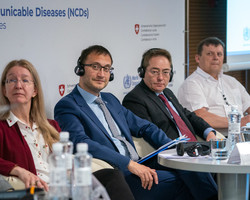Too many Ukrainians die early from preventable causes – action is needed to curb noncommunicable diseases

WHO/Volodymyr Shuvayev
For further information, contact:
Anna Borshchevska
Communications officer
WHO Country Office in Ukraine
Email: borshchevskaa@who.int
PRESS RELEASE (Kyiv, Ukraine, 28 May 2019) – Five major noncommunicable diseases (NCDs) – cardiovascular diseases, diabetes, cancers, chronic obstructive pulmonary disease and mental health disorders – contribute to nearly 84% of all deaths in Ukraine. Almost 30% of men who died in 2017 from NCDs were in the working age group of 30–65 years.
The probability of dying between the ages of 30 and 70 is much higher in Ukraine than in other European countries, and almost twice as high for men as for women. This burden is simply unaffordable for a country that strives for social and economic development and growth.
Since most of these diseases are closely linked to tobacco use, alcohol consumption, insufficient physical activity and unhealthy diet, they are largely preventable. Multisectoral action in partnership with multiple stakeholders is needed.
Ukraine’s achievements and country priorities in combating NCDs were discussed at the National Conference on Noncommunicable Diseases. The Ministry of Health of Ukraine organized and hosted the event together with the World Health Organization (WHO) and with support from the Swiss Agency for Development and Cooperation. Participants represented a wide range of stakeholders, including the World Bank, development agencies, international experts and national partners, as well as doctors and teachers from all over Ukraine.
“WHO supports countries in implementing their plans and strategies in the health sector in order to achieve the Sustainable Development Goals. More action is needed to reduce premature mortality from NCDs by one third by 2030,” said Dr Bente Mikkelsen, Director of the Division of Noncommunicable Diseases and Promoting Health through the Life-course at the WHO Regional Office for Europe.
“To achieve this target, we have to make sure that evidence-based policies are in place, that best practices for prevention and treatment are applied, and that every person can take informed decisions about their habits and lifestyle,” Dr Mikkelsen added.
“For decades, the Ukrainian health system was aimed at treatment, not prevention of diseases,” pointed out Dr Ulana Suprun, acting Minister of Health of Ukraine. “Since 2016, the transformation of the health system has been focused on preventive health-care services and health promotion. Such an approach has proven to be the most effective, particularly for combating NCDs.”
Training health-care professionals to prevent NCDs
In recent years, WHO and the Ministry of Health have trained over 10 000 family doctors and nurses in 7 regions, enabling them to better support their patients and to redistribute functions within teams to work more effectively.
“Health-care professionals are an important source of information, and their close relationship with the person seeking medical assistance is the cornerstone of the patient-centred health system,” highlighted Dr Jarno Habicht, WHO Representative in Ukraine.
“We have to make sure that doctors and nurses are equipped with the knowledge and skills for the diagnosis and management of cardiovascular and other noncommunicable diseases. In addition, they have to be able to provide evidence-based information on the key risk factors like smoking, alcohol consumption, unhealthy diet and limited physical activity, and to motivate people to choose health,” Dr Habicht explained.
Improving policy to save more lives
In addition to the training activities, the Ministry of Health and partners, including WHO and nongovernment organizations, developed a number of legislative initiatives. Among them are the national NCD action plan, draft laws on tobacco control, food-based dietary guidelines and draft legislation banning industrial trans-fatty acids.
Timely approval and enforcement of these legislative initiatives in Ukraine will ensure the country’s progress towards the Sustainable Development Goals through implementation of the WHO Framework Convention on Tobacco Control, transformation of the mental health-care system and other activities.
“I would like to express gratitude to the Swiss Government for the ongoing support of NCD prevention and health promotion in Ukraine, along with its long-standing partnership in the fields of health system strengthening and mental health. This support and our partnership have been crucial in developing many of the initiatives now in place,” concluded Dr Habicht.



